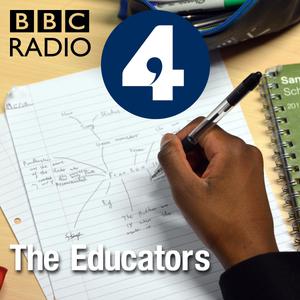
The Educators
BBC
Sarah Montague interviews the people whose ideas are challenging the future of education.
- 27 minutes 33 secondsThe First Teachers
The most important educator in most children's lives is their parents, and the first five years is deemed to be critical. Sarah Montague meets Margy Whalley, the co-founder of Pen Green Children's Centre and Research Base in Corby, Northamptonshire.
For thirty years, the centre has been educating parents about the way their children behave and learn, and using the insights of parents and nursery staff to understand the learning process of every child.
Ranked outstanding in every one of its Ofsted reports, Pen Green has influenced other centres and early years provision in the UK, and plays an ongoing role in early years research.
Presenter: Sarah Montague Producer: Joel Moors.
23 December 2015, 3:30 pm - 27 minutes 40 secondsThe World's Best Teachers
Studies have shown that the most important thing in a child's education is the quality of their teacher. A child at a bad school with a good teacher can learn more than someone at a good school getting bad tuition.
Doug Lemov has trained thousands of teachers in the UK in how to use their classroom time effectively - keeping children focused with the most subtle of techniques and gestures. His work is based on identifying the most successful teachers in the world, filming them, and studying their methods.
He believes that weak teachers can be turned into strong performers, and that the children who benefit most a well-run classroom are those from the most disadvantaged families.
Presenter: Sarah Montague Producer: Joel Moors.
15 December 2015, 3:30 pm - 27 minutes 39 secondsTurning Schools Around
Schools in England have been warned that if they coast, rather than improve, they risk being closed down.
Sarah Montague meets the new head teachers of a Birmingham secondary school involved in the so-called Trojan Horse scandal. Golden Hillock School re-opened in September with new leadership, and became Ark Boulton Academy , where some of the students have seen four different head teachers in four years.
Now, principals David Gould and Herminder Channa plan to take the school out of special measures and introduce higher expectations for students, staff and parents.
Their promise to students is that they will learn everything they need to go on to university or a career of their choice, but it will require focus, discipline and hard work from students, staff and parents.
Presenter: Sarah Montague Producer: Joel Moors.
8 December 2015, 3:30 pm - 27 minutes 38 secondsWhat Finland Did Next
Since the first international comparisons in 2000, Finland has been at or near the top of league tables for the abilities of its teenagers in reading, maths and science. Experts and politicians flocked to its schools to discover what was leading to its success, and came away with a picture of autonomous schools, children starting school much later than in the UK, and having no tests until their final year.
What developed was seen by many as a myth surrounding Finnish education success, while the reality could be attributed to extensive teacher training, high quality lessons and a culture of literacy. But now, Finland is overhauling the way it teaches through 'phenomenon learning' - periods of the school year where learning isn't confined to single subjects, but students take on a broad topic and decide what, and how, they will learn. From 2016, it will be compulsory for all schools to teach with phenomenon projects, but Helsinki has already adopted it in the capital's schools. Sarah Montague interviews the city's Education Manager Marjo Kyllonen and visits a Helsinki school, to see the changes being made to a world-leading education system.
Presenter: Sarah Montague Producer: Joel Moors.
1 December 2015, 3:30 pm - 27 minutes 38 secondsCharacter Lessons
The KIPP school movement began 20 years ago in the US. It stands for Knowledge Is Power Program, and the schools focus on two things; academic achievement and building strength of character.
They work in the most disadvantaged districts of New York, Houston and Los Angeles, where children have less than a 1 in 10 chance of completing a college degree, but their focus on character skills like grit, empathy and determination, is seen as the reason why half of KIPP students will graduate from college.
Sarah Montague speaks to KIPP co-founder Dave Levin about how character is taught alongside traditional subjects, visiting KIPP Infinity school in Harlem and hearing from Kings Langley Academy - one of many schools in the UK that are exploring character teaching.
Presenter: Sarah Montague Producer: Joel Moors.
24 November 2015, 3:30 pm - 27 minutes 53 secondsSalman Khan
Sal Khan worked as a hedge-fund analyst before he set up the Khan Academy, almost by accident, when his cousin in another city needed help with her maths homework. Since then, his online video lessons have been watched half a billion times, and he's been described by Bill Gates as 'the world's favourite teacher'.
In this programme, Sal Khan talks about how and why he set up the not-for-profit organisation. He tells Sarah Montague why he believes lesson time in school could be spent more effectively if the explanation of new ideas is done at home, with students watching video lectures, in a process known as 'flipped learning'.
He argues that pupils should have the freedom to move at their own pace, only moving on when they have mastered a concept. He says this type of learning would be done best in larger classes made up of students from mixed age groups and abilities.
Presenter: Sarah Montague Producer: Joel Moors.
1 October 2014, 10:11 am - 28 minutesJo Boaler
Is our attitude towards maths killing the subject for children? Professor Jo Boaler believes a widespread belief in the existence of a 'maths brain' is ruining pupils' chances of success in the subject.
She tells Sarah Montague that anybody can be good with numbers, but unlike other subjects, we teach the idea that some people are simply good or bad at mathematics.
Having researched the way maths is taught in schools in the UK and in the US, Stanford University professor Jo Boaler says pupils are too often made to think that maths is a long list of rules and procedures to be learned off by heart.
In the programme Sarah Montague discovers why real mathematics is about uncertainty; the study of patterns and creative problem solving. She hears about some of the controversial new methods designed to teach flexibility with numbers, which have some parents confounded by the homework their children are being set.
Presenter: Sarah Montague Producer: Joel Moors.
24 September 2014, 10:01 am - 27 minutes 58 secondsSugata Mitra
Professor Sugata Mitra, Professor of Educational Technology at Newcastle University, imagines a future where children teach themselves. Famous for his Hole-in-the-Wall experiment, he believes when young people are given the right tools and encouragement, their innate sense of wonder can allow them to learn almost anything from one another. He believes the days of traditional schooling where teachers stand at the front, and facts are taught and recalled, are numbered.
Professor Mitra's dreams are not going unheard either. Last year his TED wish to build a "School in the Cloud" won him the first $1m TED Prize. Since then, he and his team have gone on to open five learning in the cloud labs in schools in India and in the North East of England.
In this programme, Sarah Montague finds out how Professor Mitra's Hole-in-the-Wall experiment, whereby computers connected to the internet were placed in the walls of Indian slums, has evolved into a concept called a Self-Organised Learning Environment (SOLE). She hears how groups of children with minimal supervision can teach themselves, and how a team of retired teachers, or Grannies, use webcams to provide support and encouragement during the SOLE session.
Presenter: Sarah Montague Producer: Joel Moors.
17 September 2014, 9:48 am - 27 minutes 57 secondsPaul Howard-Jones
Most parents will have witnessed the magnetic effect of computer games on children. The combination of skill, memory and risk, leading to an eventual prize, can engage people of any age for hours at a time.
Paul Howard-Jones is a psychologist specialising in education and neuroscience. He tells Sarah Montague why a better understanding of what makes games so compelling, could lead to more effective teaching.
Research suggests that combining a reward with an element of risk-taking can increase the brain's appetite for learning and success.
In classrooms this could mean pupils collecting a running score, as they would in a game, then risking some of their points on a chance outcome, such as a roulette wheel spin.
Paul also discusses research into sleep, memory, and transcranial electrical stimulation - putting a low voltage across the scalp - and the impact these things have on our ability to learn.
Presenter: Sarah Montague Producer: Joel Moors.
10 September 2014, 9:37 am - 27 minutes 58 secondsDaisy Christodoulou
It's a relatively new dilemma for teachers. If the answer to almost anything is available with a search, should children be taught to remember facts, or how to find and use them?
Teacher and writer Daisy Christodoulou tells Sarah Montague why she thinks a generation of school children are being let down by discovery learning, which places emphasis on students finding out for themselves.
It's the opposite of traditional 'chalk and talk'. But have classrooms already moved too far towards skills and group work, in the interest of pleasing inspectors?
Based on her own time in classrooms, Daisy Christodoulou believes young people have vast gaps in their knowledge and understanding, and that traditional fact-based lessons would serve them better.
Presenter: Sarah Montague Producer: Joel Moors.
3 September 2014, 9:25 am - 27 minutes 57 secondsTony Little
Eton College in Berkshire is one of the world's most famous schools. With so many of its old boys having distinguished careers, an Eton education carries the expectation of success.
The school's name has also become a cultural shorthand for influence, privilege and wealth.
Tony Little became headmaster in 2002. A former pupil of the school, he talks to Sarah Montague about how Eton gets results, and whether there's anything in the ethos and practice that could apply to all schools.
He believes a British education is uniquely rich and varied, with much of the value being outside the classroom, but fears it is being eroded by an age of measurement.
Nineteen British prime ministers have been educated at Eton, alongside notable writers, actors and scientists. Tony Little says it asks something of all the boys there. "If they've done it, why not you?"
Presenter: Sarah Montague Producer: Joel Moors.
27 August 2014, 2:17 pm - More Episodes? Get the App
Your feedback is valuable to us. Should you encounter any bugs, glitches, lack of functionality or other problems, please email us on [email protected] or join Moon.FM Telegram Group where you can talk directly to the dev team who are happy to answer any queries.
 Education Research Reading Room
Education Research Reading Room
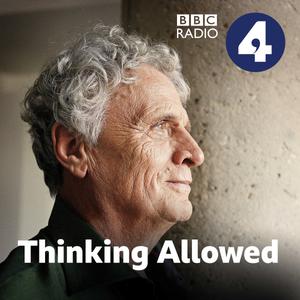 Thinking Allowed
Thinking Allowed
 Friday Night Comedy from BBC Radio 4
Friday Night Comedy from BBC Radio 4
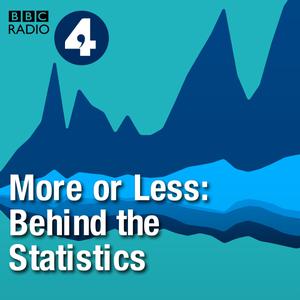 More or Less: Behind the Stats
More or Less: Behind the Stats
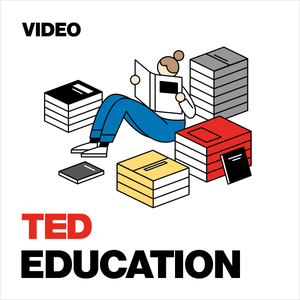 TED Talks Education
TED Talks Education
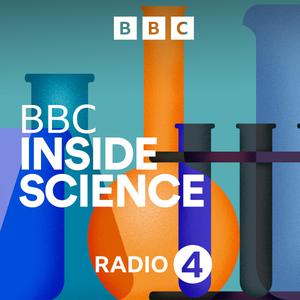 BBC Inside Science
BBC Inside Science